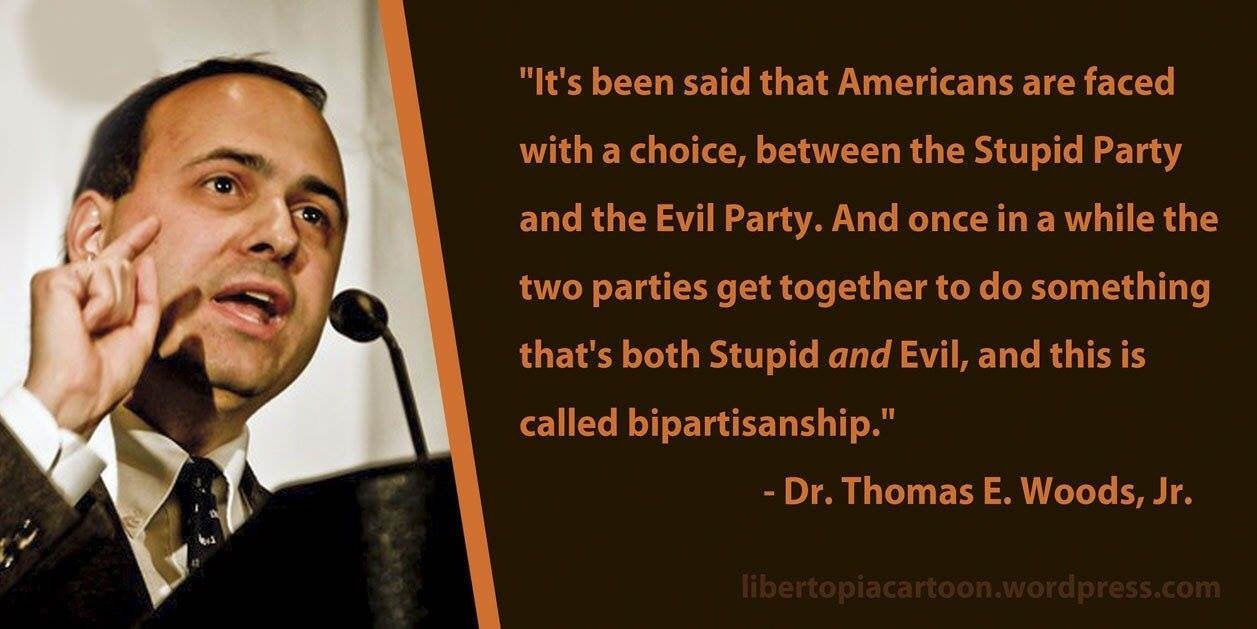Yves here. Tom Neuburger describes some of the far too many examples of Democrats and Republicans professing to care about public welfare, then teaming up to advance the interests of elites at the expense of everyone else. And when that happens, it is nauseatingly called bipartisanship.
Neuburger highlights examples of when the more feral elements in both parties have teamed up to defeat measures that hurt ordinary citizens, such as cutting Social Security. Needless to say, the mainstream media seldom acknowledges the otherwise odd fellows collaborations that make these victories possible. Instead, it calls the perps “populists” as if that were bad.
Neuburger reminds his readers of a current threat, the RESTRICT Act, which would greatly increase Internet censorship, as we’ve warned long-form.
By Thomas Neuburger. Originally published at God’s Spies
“This is good headaches.”
—Emily Jashinsky
Most people’s idea of bipartisanship in Washington is Democrats and Republicans coming together to name a Post Office (though that course is not always smooth), beef up our beefy wars, or reauthorize our endless tax cuts for the rich. There’s also negative bipartisanship, when both parties reject something most people want, like Medicare For All.
This is the kind of bipartisanship we see when those who rule, the donors who finance both parties, garner both parties’ support for what they want.

This kind of bipartisanship also assumes that the big fight is between the “right” and the “left,” whatever that means in America, not between those who serve wealth — and maintain the status quo where wealth always wins — and those who’d rather to disrupt that gravy train.
The Other Bipartisanship Saved Social Security
Yet every now and then a coalition forms in Congress that threatens the plans of the wealthy, and that coalition is, for want of a word, bipartisan.
This happened spectacularly during Barack Obama’s presidency when he tried for years to cut Social Security benefits — he styled it as a “Grand Bargain” between reasonable Democrats and Republicans, as if it were a good bipartisan thing.
Guess who ultimately killed it?

House progressives and Tea Party representatives, acting separately but together:
“One of the ironies is that the tea party was more useful than Democratic leadership when it came to killing a grand bargain that would have cut Social Security benefits,” said Adam Green, co-chair of the Progressive Change Campaign Committee…. “They were so crazy and unwilling to take ‘yes’ for an answer. That allowed us to live to fight another day.”
“Thank you, tea party!” Green added.
That’s the other kind of bipartisanship.
Bipartisanship Today
Ryan Grim and Emily Jashinsky spotted a different bipartisanship in their April 7 Breaking Points broadcast (segment available only to paid subscribers; start at the 49 minute mark if you have access).
After discussing the first kind of bipartisanship, where party leaders get together to support other leaders — in this case, Nancy Pelosi supporting Speaker McCarthy’s meeting with the Taiwanese president — they point to a Politico article that spots the other kind, the kind party leaders don’t like:
Freedom Caucus and progressives lock arms — and that could be bad news for McCarthy
The speaker’s immediate headache is a growing right-left alliance on Iraq war powers. But House liberals and conservatives are linking up on other issues, too.
The House’s most conservative Republicans and its most liberal Democrats can barely stand each other most days. But lately they’re building an unlikely alliance that could cause real problems for Speaker Kevin McCarthy.
The Donald Trump-aligned Freedom Caucus and the Progressive Caucus are openly uniting in favor of repealing two decades-old war authorizations in Iraq. That’s on top of growing agreement between the two groups’ members in favor of revamping government surveillancepowers and curbing defense spending. [emphasis added]
Using Speaker McCarthy’s weakness against him — he has a roughly four-vote margin on any proposal — the Freedom Caucus, heirs of the Tea Party, are allying with progressives not just to pass repeal of the 1991 and 2002 AUMFs (authorizations for use of force in Iraq), but other good measures as well.
The AUMF repeals matter because they’re still being used to justify war in other countries, especially the one AUMF not (yet) up for repeal, enacted in 2001 after 9/11:
Wolf Blitzer: The US military has not been using this authorization [unspecified] to justify military action since 2009. But the US military has been very active in Iraq, just with a different authorization or with the agreement of the Iraqi government.
In fact, every year, the White House tells Congress where the military has been active using military force in the preceding year. In 2021, the unclassified version of the report lists actions in Iraq, Afghanistan, Syria and Somalia. And they were all justified by the 2001 AUMF relating to terrorism.
Sen. Tim Kaine: The 2001 authorization to take action against terrorist groups that have some tie to those who perpetrated the 9/11 attack is still a live authorization, and that needs to be rewritten. [emphasis added]
Politico adds:
It’s not just the war powers effort that’s bringing together the House’s opposing factions. They’ve also united to push for pumping the brakes on a potential ban of TikTok, airing fears of government overreach while more establishment colleagues share national security worries.
In addition, Progressive Caucus chief Rep. Pramila Jayapal (D-Wash.) and Freedom Caucus member Rep. Warren Davidson (R-Ohio) are jointly raising concerns about government surveillance laws ahead of a reauthorization deadline at the end of the year.
The left and right frequently align “on issues of war, civil liberties and privacy,” Jayapal said. “We do have things that we see eye to eye on, and I think we’re always going to look for those opportunities.”
RESTRICT Expands the Power of the Security State
Among the issues are repeal of the infamous Section 702 of the FISA Act (more here) and the upcoming RESTRICT Act, a bipartisan op by Sens. Mark Warner and John Thune, supposedly aimed at TikTok, but with much broader reachthan its supporters want to see advertised. For example, by the language of the act, RESTRICT could be used to criminalize individuals for using a VPN to access TikTok if U.S. access is banned.
Critics are calling RESTRICT “a Patriot Act 2.0 which opens the door to unprecedented digital surveillance of Americans, and gives an appointed executive panel unchecked power to censor the internet in the U.S.”
Worth fighting against? If you give the national security state even more power, what do you think it will do?
Back to bipartisanship, Emily Jashinsky says at the close of the Breaking Points piece: “These [bipartisanship] headaches would be good for the American people. This is good headaches.”
What kind of bipartisanship do we want? The smooth-as-silk kind that keeps the Pentagon flush and grows the power of our own Praetorian Guard?
Or the disruptive kind that preserves Social Security and fights against state surveillance, at least till the next bipartisan attack appears?



We can’t fix things in this country and the world by voting for the Red or Blue Teams. I have been voting since the 1970s, and things have only gotten steadily worse since that time, no matter who I voted for, or who won the election. Only people who can be corrupted are ever allowed to run for high office, so you get to vote for crook A or crook B. The one way that does work, everyone has been convinced is hopeless, and that is to complain directly to your representatives. If one million people wrote or called to their representatives today, it would shake DC up. If ten million did it, panic would set in. If 20 million did it… You get the idea. The only times in my life when good things have happened is when the public pressure gets too intense for the crooks to ignore. That is why they tell you that contacting your congress person is hopeless. They don’t want to hear from you. So start calling and writing, and get everyone you know to do the same. Don’t let them think that everyone is OK with their conniving.
It sounds like what Arlo Guthrie proposed in “Alice’s Restaurant”:
And friends, somewhere in Washington enshrined in some little folder, is a study in black and white of my fingerprints. And the only reason I’m singing you this song now is cause you may know somebody in a similar situation, or you may be in a similar situation, and if your in a situation like that there’s only one thing you can do and that’s walk into the shrink wherever you are, just walk in say “Shrink, You can get anything you want, at Alice’s restaurant.” And walk out. You know, if one person, just one person does it they may think he’s really sick and they won’t take him. And if two people, two people do it, in harmony, they may think they’re both faggots and they won’t take either of them. And three people do it, three, can you imagine, three people walking in singin’ a bar of Alice’s Restaurant and walking out. They may think it’s an organization. And can you, can you imagine fifty people a day, I said fifty people a day walking in singin’ a bar of Alice’s Restaurant and walking out. And friends they may thinks it’s a movement.
And that’s what it is, the Alice’s Restaurant Anti-Massacree Movement, and all you got to do to join is sing it the next time it come’s around on the guitar.
So many good candidates in the primaries since the 70’s, laughed at by the crooks and the press, and when they get to close, stabbed in the face. It’s tiring to say the least.
We saw Bernie Sanders get slapped down, before that, Mike Gravel.
Say what you will about Marianne Williamson, it’s people like her that are barely able to steer the narrative, and in the end, the crooks will fight tooth and nail to not even allow any narrative beyond the cold gruel pre-approved talking points and candidates.
Perhaps it would be more accurate to talk about the donors behind the two political parties who after all, belong to the same class. There would be some donors who would be inclined to donate to the Democrats and others who would donate to the Republicans. Probably a larger group who would donate to both political parties as it is ‘just business’. But when it comes to an opportunity to increase their wealth of that class by, for example, privatizing Social Security to Wall Street, then that is when you see them getting both political parties get behind such legislation which is where you get bipartisan bills.
>About That Bipartisanship:
Afflict the afflicted and comfort the comfortable.
Who said: I don’t care who people vote for as long as I get to choose the candidates?
To answer your question, a Democrat, Boss Tweed.
it took a democrat, bill clinton, to inact the republican agenda.
And another Democrat, Barack Obama to perpetuate it.
When you figure the village idiot could rename a post office, why do we need Congressmen to do that, but I repeat myself.
Also, both parties are both silent about the huge corruption of money in politics… not a word of any reform, not a peep, silence from the press in asking about the corrupting influence or possibility of reform, no noise of campaign finance reform or challenging Citizens united…
“The overwhelming influence of great private monopolies in both legislatures and courts cannot continue if we are to maintain popular government. If we fail to regulate grants of public powers properly, invasion of private rights by those powers will be our proper and certain reward.”
“We had to struggle with the old enemies of peace–business and financial monopoly, speculation, reckless banking, class antagonism, sectionalism, war profiteering.
They had begun to consider the Government of the United States as a mere appendage to their own affairs. We know now that Government by organized money is just as dangerous as Government by organized mob.
Never before in all our history have these forces been so united against one candidate as they stand today. They are unanimous in their hate for me–and I welcome their hatred.”
Election eve speech at Madison Square Garden (October 31, 1936)
Franklin Delano Roosevelt
One of my favorite speeches, ever! Here is a link to the full text of that speech: https://www.presidency.ucsb.edu/documents/address-madison-square-garden-new-york-city-1
The speech has so many good parts, like what came right after FDR’s “welcome their hatred” comment:
“I should like to have it said of my first Administration that in it the forces of selfishness and of lust for power met their match. I should like to have it said of my second Administration that in it these forces met their master.”
Wow! I can’t even imagine any contemporary politician making this type of speech, even though today’s environment calls out for it. Thanks for reminding me of the speech, it always brings a smile!
This article points out a movement to what I’ll call a new center, a series of issues/topics that progressives (though I must admit to not liking that term so much anymore) and Tea Partiers/Freedom Caucusers can come together on. Just another in a series of examples, The Squad (tho it was late to the party) and Marjory Taylor Greene are now both saying that the case against Julian Assange should be dropped; Taibbi and the Twitter files, and one of course has to add Greenwald and his subscribers to the list. Not only is this happening here in the States, but it is happening in Europe as well. See Sahra Wagenknecht in Germany, who is, as far as I can tell, building bridges in a principled manner with elements of the German right.
In my view, this potential “new center” is a fantastic development. To the extent any NC readers are involved in local, regional or national politics, I would say that we should always seek out ways to cross the bridge over to the Tea Partiers/Freedom Caucusers if there is a possibility of cooperation on issues (even though there will be many, many issues where differences will remain).
Finally, I suspect the Uniparty is already looking at this new centerism and trying to figure out how to defeat it. I wonder what steps we shall soon see in this regard.
This ‘new center’ – good moniker – is what Jimmy Dore et al. has been advocating –
smeared as the dread ‘red/brown’ alliance by status-quo centrists (and cowardly ‘progressives’).
JD on his stance, esp. toward the end:
https://drdrew.com/2023/jimmy-dore-on-comedy-woke-ideology-how-to-enrage-both-conservatives-liberals-ask-dr-drew/
Never forget, the Good Ol’ USA has the best damn government money can buy!
As I’m fond of saying, when something is bi-partisan in Washington, hold on to your wallet, you’re about to get robbed.
The picture showing Michelle Obama’s affection for George W. Bush, a war criminal whose presidency had an extreme conservative agenda is beyond sickening.
Michelle and Barack Obama are living in a seaside compound on Martha’s Vineyard, so thay’re doing just fine.
Don’t forget the Clintons. First, Hillary voted for the Iraq AUMF (as did the very bipartisan Chairman of Senate Foreign Relations Joe Biden) in November 2002, just before the mid-terms. Then Bill went on a mission (I believe in early 2003) to convince Blair’s Labor Party MP’s to vote for an Iraq war resolution in Parliament. The Laborites wouldn’t hear an appeal by anyone in the detestable GWB Jr. Administration, so Bill came to the rescue, and sure enough, he won them over. “Trust us! We need leverage over Saddam for inspections!” What a bipartisan couple! What a bi-partisan President we now have! The rest is a very sad history.
I have read that they are living on the White side ( the Rich side) of the Island.
Yes, the [genuflects] are in Martha’s Vineyard, not Oak Bluffs.
Prompting the old joke: “Wait. Obama’s Black?” which I was told not to use — the joke was not created by or for Whites — many years ago, but I figure enough time has passed…